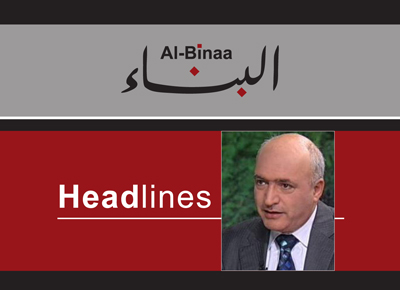U.S.-Arab Tensions Over the Gaza Plan… Egyptian Positions Delay El-Sisi’s Visit / Netanyahu Threatens War, Empowered by Trump, but Accepts Returning to the Agreement on Saturday
Government Begins Its Work With Ministerial Statement, Aiming to Preserve Internal Cohesion

February 12, 2025
The political editor wrote
The meeting between Jordan’s King Abdullah II and U.S. President Donald Trump exposed the extent of tensions in U.S.-Arab relations. While the Jordanian king refrained from openly opposing Trump’s plan to displace Gaza’s population, he did not endorse it either. Instead, he tied the matter to a unified Arab stance that would be announced at the upcoming Arab summit, with a delegation led by Saudi Arabia and Egypt set to engage Washington. However, the postponement of Egyptian President Abdel Fattah el-Sisi’s visit to Washington underscored the deadlock in U.S.-Arab relations, particularly after Egyptian Foreign Minister Badr Abdel al-Aty informed his American counterpart, Marco Rubio, that Egypt was not prepared to participate in Trump’s Gaza displacement plan. Meanwhile, successive Saudi statements, the latest following a Saudi cabinet meeting, reaffirmed “absolute rejection of extremist Israeli rhetoric regarding the displacement of the Palestinian people from their land” and emphasised “the centrality of the Palestinian cause to Saudi Arabia”. The statement also stressed that “lasting peace can only be achieved through the acceptance of peaceful coexistence based on a two-state solution”.
In parallel, Trump’s threats to unleash hell on the resistance if all Israeli prisoners were not released by Saturday dominated discussions. His remarks were a direct response to the resistance’s warning that it would suspend prisoner exchanges unless the agreement’s implementation was corrected, ensuring Israel adhered to humanitarian protocols and allowed sufficient aid into Gaza. Hamas reaffirmed its commitment to the deal and called on mediators to pressure Israel to do the same. Meanwhile, the Israeli security cabinet convened an emergency meeting, drawing strength from Trump’s threats but leaving room to return to the agreement. It demanded that Hamas release the agreed-upon nine prisoners on Saturday, signaling that war is not as simple an option for Israel as Trump suggested. This also debunked the narrative that Israel had intended to continue the war and that Trump’s pressure had prevented it – an assertion that now appears to have been mere propaganda aimed at projecting Israeli strength and marketing Trump’s role in the agreement.
In Lebanon, the new government held its first session following the official group photo. After the meeting, Information Minister Paul Morcos announced the formation of a ministerial committee tasked with drafting the government’s policy statement. The committee includes Deputy Prime Minister Tarek Mitri, Minister of Culture Ghassan Salamé, Minister of Finance Yassin Jaber, Minister of Public Works Fayez Rasamni, and Minister of Information Paul Morcos. He indicated that the statement would be concise and direct. Later in the evening, Prime Minister Nawaf Salam spoke on Télé Liban, stating that the government’s focus was on fostering national cohesion in line with the president’s inaugural speech. He emphasised that the priority remains Israel’s full withdrawal from all occupied Lebanese territory and the implementation of UN Resolution 1701. Sources involved in drafting the ministerial statement noted that contentious issues would be addressed using provisions from the Taif Agreement.



